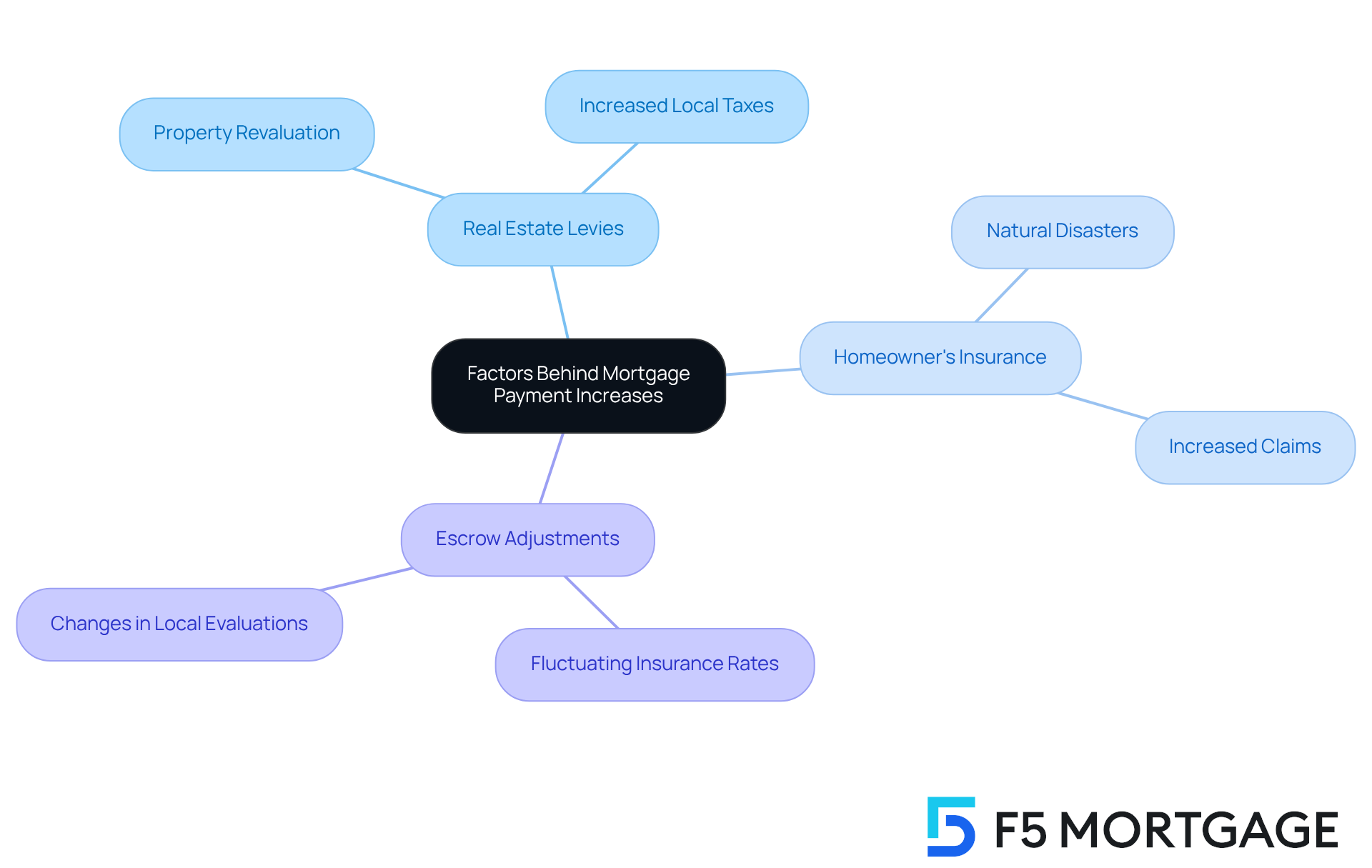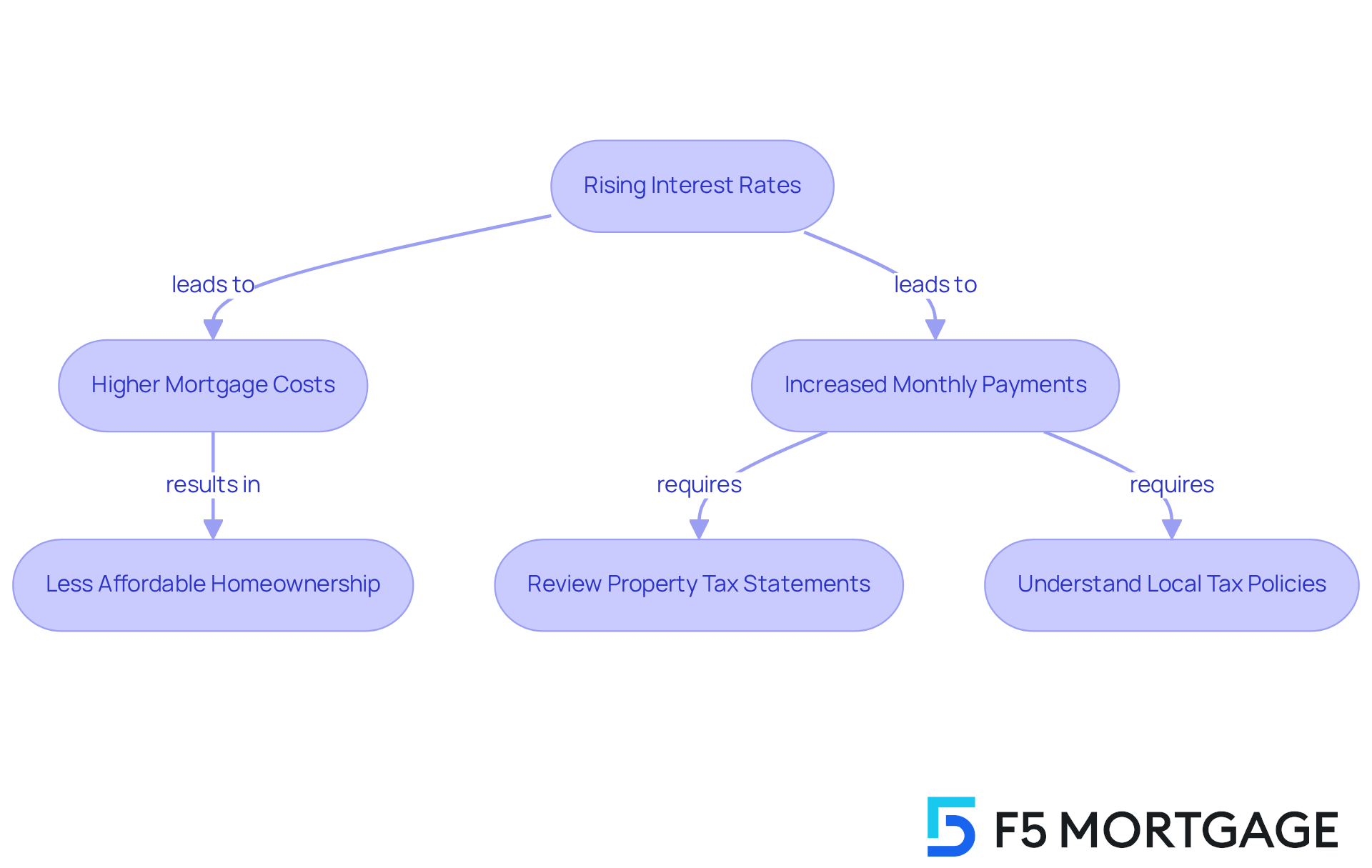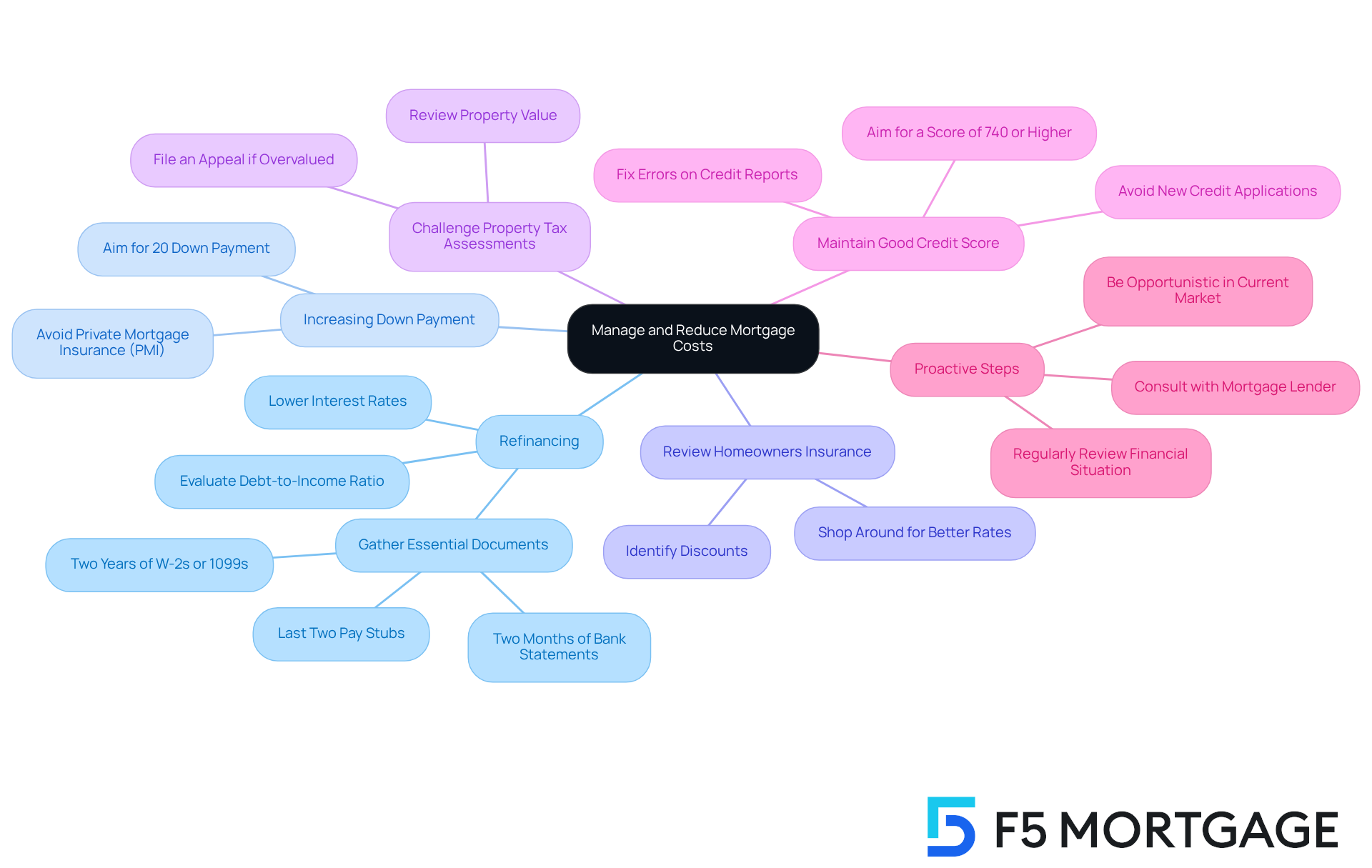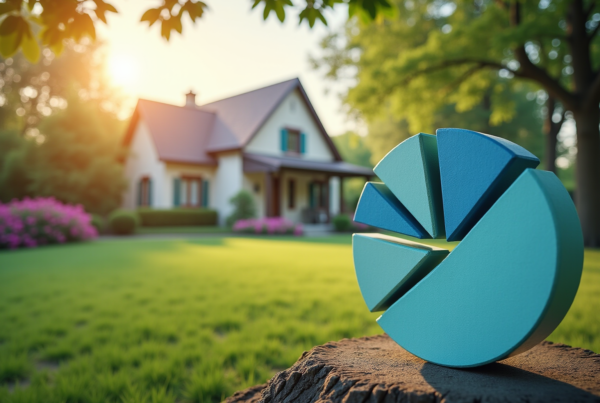Overview
Mortgage payments can sometimes feel overwhelming, especially when they increase due to various factors. We know how challenging this can be. Rising property taxes, higher homeowner’s insurance costs, and fluctuations in escrow accounts can all contribute to larger monthly payments. As property values and insurance rates rise, it’s essential to understand these dynamics to manage your mortgage expenses effectively.
By acknowledging these challenges, we can explore solutions together. Understanding how these factors influence your payments can empower you to make informed decisions. Remember, you’re not alone in this journey; we’re here to support you every step of the way.
Take a moment to assess your current mortgage situation. Are you aware of any upcoming changes in property taxes or insurance rates? Staying proactive can help you navigate these shifts and maintain control over your financial future.
Introduction
Rising mortgage payments can leave homeowners feeling anxious and confused. It’s understandable, especially when these payments seem to increase without warning. We know how challenging this can be. Understanding the underlying factors—such as fluctuating interest rates, property tax assessments, and homeowners insurance costs—is crucial for managing these expenses effectively.
As homeowners grapple with these changes, they often find themselves questioning the reasons behind their escalating payments. What strategies can be employed to mitigate these increases? We’re here to support you every step of the way, helping you regain control over your mortgage costs. Let’s explore some practical steps together.
Identify Key Factors Behind Mortgage Payment Increases
There are various reasons why mortgage costs can rise, which leads to the question of why does my mortgage keep going up, and we understand how concerning this can be. The increased expenses from changes in real estate levies, homeowner’s insurance fees, and adjustments in escrow accounts explain why does my mortgage keep going up. Homeowners often pay assessments and insurance through an escrow account, which may fluctuate based on local evaluations and insurance rates. For instance, if a homeowner’s property is revalued at a higher amount, they might question why does my mortgage keep going up, as this could lead to larger monthly payments due to increased taxes. Additionally, rising insurance costs due to factors like natural disasters or increased claims are part of the reasons why does my mortgage keep going up.
Recognizing these factors is essential for homeowners to understand why does my mortgage keep going up and to manage their mortgage expenses effectively. With the ongoing trends in Colorado’s housing market, where property values are on the rise, securing favorable mortgage terms with F5 Mortgage becomes even more crucial. By obtaining a competitive rate, homeowners can protect themselves from potential increases in monthly costs driven by market fluctuations.
Moreover, refinancing options available through F5 Mortgage can provide significant benefits. These include lower monthly payments and access to funds for home improvements. It’s important for families looking to enhance their homes to consider these strategies. We’re here to support you every step of the way as you navigate these decisions.

Examine the Role of Interest Rates and Property Taxes
Interest levels play a crucial role in determining mortgage costs, and we know how challenging this can be for families. When the Federal Reserve raises interest levels, borrowers may ask themselves why does my mortgage keep going up, as lenders often pass these costs onto them, resulting in higher monthly payments. For instance, just a 1% increase in interest can significantly elevate the total expense of a mortgage over its term. As of June 2025, the national average for a 30-year fixed-rate mortgage stood at around 6.81%, a sharp contrast to the historic lows we saw in early 2021. Many families are wondering why does my mortgage keep going up, as this rise in rates has made homeownership less affordable and monthly payments continue to climb.
Additionally, real estate taxes are often tied to municipal budgets, which may increase due to heightened funding needs or changes in property valuations. Homeowners in rapidly growing areas might notice their tax rates rising as local governments adjust budgets to meet the increasing demand for services. It’s essential for homeowners to regularly review their property tax statements and stay informed about local tax policies. By doing so, you can anticipate why your mortgage keeps going up in your overall payments. Understanding these dynamics empowers borrowers to navigate the financial landscape more effectively and make informed decisions about home financing. We’re here to support you every step of the way.

Explore Strategies to Manage and Reduce Mortgage Costs
Homeowners, we understand how challenging it can be to manage mortgage costs, and you might be wondering why does my mortgage keep going up, but there are several effective strategies you can consider to alleviate this burden. One of the most impactful options is refinancing to a lower interest rate, especially if market prices have decreased since you first obtained your loan. For example, refinancing could lead to significant savings, particularly when rates are at least 50 basis points lower than your current rate.
Additionally, increasing your down payment can greatly reduce both the total loan amount and your monthly payments. Research shows that a down payment of at least 20% can eliminate the need for private mortgage insurance (PMI), further easing your overall expenses.
It’s also wise to regularly review and shop around for homeowners insurance, as these costs can creep up every few years. If you feel your property has been overvalued, consider challenging the property tax assessments, which can lead to a lower assessed value and, consequently, lower monthly mortgage costs, thus answering the question of why does my mortgage keep going up.
Maintaining a good credit score is crucial as well; even small improvements can lead to better loan terms. Experts suggest aiming for a credit score of at least 740 to qualify for the best rates, which can have a significant impact on your monthly payments.
By taking these proactive steps, you can effectively lower your mortgage costs and enhance your financial well-being. Remember, we’re here to support you every step of the way.

Conclusion
Understanding the reasons behind rising mortgage payments is crucial for homeowners navigating their financial responsibilities. We know how challenging this can be. The article outlines several key factors that contribute to this phenomenon, including:
- Changes in real estate taxes
- Homeowner’s insurance rates
- Fluctuations in escrow accounts
These elements can lead to increased monthly costs, prompting homeowners to question why their mortgage keeps going up.
The discussion also emphasizes the significant impact of interest rates and property taxes on mortgage costs. As interest rates rise, borrowers face higher monthly payments, which can strain budgets. Additionally, local governments adjusting tax rates to meet growing service demands can further escalate expenses. By staying informed about these dynamics, homeowners can better anticipate changes in their mortgage payments and take proactive steps to manage their finances.
Ultimately, we’re here to support you every step of the way. The article encourages homeowners to explore strategies for reducing their mortgage costs, such as:
- Refinancing
- Increasing down payments
- Regularly reviewing insurance policies
By implementing these tactics, individuals can alleviate the financial burden associated with rising mortgage payments. Taking action now can lead to improved financial stability and peace of mind in the face of fluctuating market conditions.
Frequently Asked Questions
Why do mortgage payments keep increasing?
Mortgage payments can increase due to various factors such as changes in real estate taxes, homeowner’s insurance fees, and adjustments in escrow accounts. For example, if a property is revalued at a higher amount, it may lead to larger monthly payments due to increased taxes.
How do escrow accounts affect mortgage payments?
Homeowners often pay assessments and insurance through an escrow account, which can fluctuate based on local evaluations and insurance rates. Changes in these factors can result in increased mortgage payments.
What role do rising insurance costs play in mortgage payment increases?
Rising insurance costs, which can be influenced by factors like natural disasters or increased claims, can contribute to higher mortgage payments, as these costs are often included in the escrow account.
How can homeowners manage their mortgage expenses effectively?
Understanding the key factors that lead to mortgage payment increases is essential for homeowners. By being aware of potential changes in taxes and insurance, they can better manage their mortgage expenses.
What is the current trend in Colorado’s housing market?
Colorado’s housing market is experiencing rising property values, which can lead to increased mortgage payments for homeowners.
How can homeowners protect themselves from potential increases in monthly costs?
Homeowners can secure favorable mortgage terms with lenders like F5 Mortgage to protect themselves from potential increases in monthly costs driven by market fluctuations.
What refinancing options are available to homeowners?
Refinancing options through F5 Mortgage can provide benefits such as lower monthly payments and access to funds for home improvements, which can be advantageous for families looking to enhance their homes.








